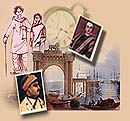 |
| a home away from home |
| HOME FEEDBACK TELL A FRIEND WEB SITE DESIGN CAREER WITH US CONTACT US |

Reform
and Education:
The character of the
city soon changed from a British trading and political centre into a cultural
and literary arena in the 19th century. The British adopted a policy of
reforming Indian society by introducing English education and western
sciences. The concept of producing a strand of people who would be English
in all but in colour
sums
up the imperial sense of racial superiority of the English. Calcutta was
the first Indian city
to feel the social and political impact of colonialism.
The Bengali elite responded enthusiastically to the reform movement. They wished to acquire western education. Hindu college later Presidency College was established by the Bengali and British initiative. The British with the purpose of administrating the expanding bureaucracy chose to educate the
Bengali elite in English and Western sciences and entrust them the administration of the expanding empire.These developments brought Calcutta to the center of the 19th century reform movements. Thus started the resurrection of the Indian society. Campaign against idolatry and caste system started in 1816.
Raja Rammohun Roy, the pioneer of the renaissance found a new religious group called the 'Brahmo Samaj', which resulted from a purer interpretation of the Hindu scriptures. Rammohun was also in favour of English pedagogy and western science. He vigorously campaigned for the abolition of Sati, an inhuman act of immolating the widow on her husband's funeral pyre.


In its wake came Iswarchandra Vidyasagar, who campaigned, on the basis of scriptures for the remarriage of Hindu widows. The Widows Remarriage Act was passed by the government in 1856. The enthusiasm to learn English and Western sciences influenced the lifestyle of many. Emulating the English went on to an extent that many felt the growing concern about losing their identity. The entire era remained
busy in
western education and enlightenment which gave rise to some Anglo maniacs.
The distinctive feature of the English educated in the first half of the
19th century was loyalty to British rule. The Sepoy uprising was the burning
example. The elite of Calcutta was gripped by panic and was terrified
that they would inevitably be the target of the rebels. In response to
the crisis they organised a public meeting where they avowed their loyalty
to the British administration.
GREAT INDIANS || BENGALI SECTION || BENGALI MARRIAGE || BABY'S NAME || WALLPAPER || BENGAL || WEATHER || TRAVEL
MOBILE WALLPAPER || E-CARD || MOVIE || WEBSITE LINKS || ASSOCIATIONS || SHOPPING || ASTROLOGY || MUSIC || BEAUTY CARE
TIGER || NEWS || GUEST CORNER || FEEDBACK || LINK TO US || FOR ADVERTISING || SERVICES || CONTACT || BENGALI CALENDAR
Graphics, Sound or content copied or produced in part or whole in any media will be illegal.
Persons or websites caught using our material will be penalized.
Privacy Statement || Copyright
Copyright ©1999-2014 BANGALINET.COM